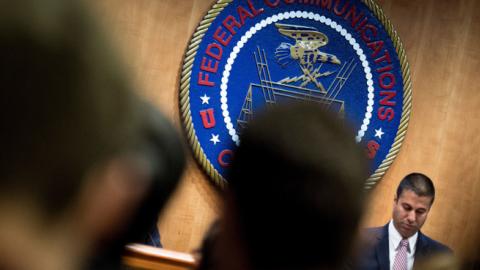For more than two decades, the Federal Communications Commission has been trying to modernize its series of broadcast ownership rules. Recently, a divided panel of the Third Circuit Court of Appeals in Philadelphia told the FCC to try yet again. The same court has reached a similar conclusion repeatedly over the past 16 years.
In the middle of the 20th century, broadcasting was growing rapidly and was thought to be influential. Lucille Ball and Edward R. Murrow were household names.
Between 1941 and 1975, the FCC wrote rules to limit what a broadcaster might own including the number and types of broadcast stations in a geographic area. In 1975, the FCC even prohibited a broadcaster from owning a local newspaper. The all-too-obvious target was none other than the Washington Post, the initial source of much of the Watergate investigation that ultimately ended the Nixon Administration.
A generation ago, many if not most Americans received news and entertainment from broadcasting and newspapers. Those days are past and not returning. Today, many Americans watch cable, and many more receive news and information online. The number of newspapers in America dwindles rapidly; their profits have long vanished.
Broadcasters struggle against newer technologies, and the FCC has rules that burden only broadcasters to make them even less competitive. Internet companies and online sites, some of which are far more popular that broadcast stations, need not worry about the same rules that broadcasters face.
The outdated nature of the broadcast ownership rules was not lost on Congress. The Telecommunications Act of 1996 required the Commission once every two years to review—and, when competition allowed, to deregulate-- its broadcast ownership rules. When the Commission could not act every two years, Congress relaxed the requirement to once every four years. The requirement to deregulate as a result of competition is clear.
Each time the FCC modifies the anachronistic broadcast ownership rules, the new rules are challenged in court. Those challenges have been consolidated at the Third Circuit. Commission changes to the broadcast ownership rules have never withstood review by the Third Circuit.
The Third Circuit panel did not decide on the merits of the relaxed ownership rules. Nor did it opine that the new rules were inconsistent with law. Instead, the panel found what it considered procedural flaws: despite a 100-page order filled with detailed explanations, the FCC had not explained its reasoning for changing the rules well enough. The Third Circuit panel has not been satisfied with the Commission’s explanations for changing broadcast ownership rules for 16 years.
The Third Circuit panel is particularly concerned with the effect of rule changes on women and minorities. Ironically, failing to deregulate as required by law in the face of competition harms all Americans, including women and minorities. Rules that prohibit the efficient transfer of assets harm buyers and sellers of all backgrounds. Rules that prohibit the efficient sales of newspapers and broadcast stations harm everyone by depriving the public of new and innovative services.
Nor is antitrust the rationale for preserving the FCC’s antiquated ownership rules. The federal government has not one but two highly competent antitrust agencies to protect Americans from anticompetitive behavior. The FCC rules of counting the numbers of voices in a market has perhaps more in common with an Ouija board than with contemporary antitrust practice. If the issue were protecting competition for news and information in local geographic markets, the American public looks to the professional antitrust agencies.
Every year, the Commission publishes many rule changes, the vast majority of which withstand court challenges. It is a mystery why the Commission’s explanations are sufficient in other courts but inadequate for the Third Circuit Court panel.
Critics of the FCC say it should take another four years to address the Third Circuit’s process concerns. Chairman Ajit Pai of the FCC says that he will instead appeal the Third Circuit decision. He should. The American public deserves much better than to have the FCC’s outdated broadcast ownership rules remain in place permanently. America races through the 21st century. Our regulations should keep pace. That is exactly what the Telecommunications Act of 1996 required.

















